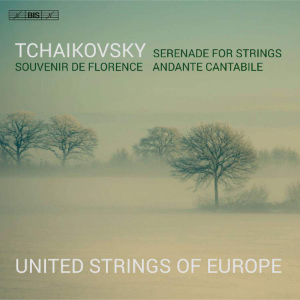
Piotr Ilyich Tchaikovsky (1840-1893)
Serenade for Strings in C major, Op.48 (1880)
Andante cantabile from String Quartet No. 1, Op.11 (1871, arr. Julian Azkoul)
String Sextet in D minor (Souvenir de Florence), Op.70 (1890, arr. Julian Azkoul)
At Bedtime (Na son gryadushchiy) for mixed chorus (1863/64, arr. Julian Azkoul)
United Strings of Europe/Julian Azkoul
rec. 2020/21, St Silas Church, Kentish Town, London
BIS BIS2569 SACD [78]
The United Strings of Europe is a relatively small band: thirteen players for the String Serenade and At Bedtime, then an extra viola and cello are added for the other two items, giving additional weight to the bass line. They often play with a lean, vibrato-free tone which verges on keening but the sonority of the lower strings negates any sense of acerbity or asperity; however, if you are accustomed to hearing, say, Karajan’s Berlin strings play the Serenade, their relative leanness will demand some adjustment on your part.
The programme itself is a delightful compilation of works by Tchaikovsky at his most melodic and Romantic. Despite the Serenade being an “homage to Mozart”, the nods towards Classical style are subsumed into the composer’s idiom and the music, as director Julian Azkoul ‘s notes rightly say, “is infused with Tchaikovsky’s characteristic pathos and melancholy” – and the influence of Russian and Ukrainian folk tunes is never far away.
One advantage of a smaller group of players, of course, is that there is greater textural variety than comes from a larger body of strings; individual voices and lines emerge more strikingly and in the passages when the spotlight is upon soloists, especially in the Andante cantabile and Souvenir de Florence, one may hear how virtuosic these players, assembled here from across Europe, really are – a feature deliberately and expressly accentuated by Azkoul’s own arrangements. Conversely, timing, unanimity and homogeneity are mightily impressive; to take some random but telling examples, listen to the forte pizzicato chord which concludes the Allegretto moderato of the Souvenir de Florence or the attack in the fugue and the frenetic coda to the finale.
Azkoul’s string arrangement for the student work At Bedtime is based on the earliest version of the music devised for an a cappella mixed chorus. It already evinces the mournful, yet somehow tender and consoling, strain typical of the composer’s later idiom in slow movements, and retains something of the character of Russian Eastern Orthodox chant. It makes a fitting, yet unusual, conclusion.
The sound could not be better: beautifully balanced and luscious, with some air and space around the reverberation but no muddiness. Eco-friendly cardboard digi-packaging and useful notes are as we have come to expect from BIS.
I might still want to hear Karajan’s Rolls-Royce version of the Serenade and I am fond of the perkier, more astringent sound of the Radio Chamber Orchestra of Poland in that music on a bargain ASV Quicksilva disc – but they are clearly not as sophisticated as the ensemble here. I shall also want to turn sometimes to the original string sextet version of the Souvenir, as played by the augmented Borodin Quartet, but the performance and arrangements on this new release make a very attractive, wholly successful and, indeed, unique, collection.
Ralph Moore
Help us financially by purchasing from





















